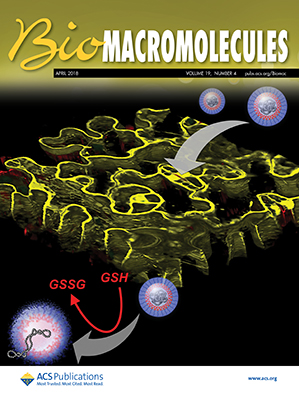含Pripol基团的聚(丁烯反式-1,4-环己二羧酸酯)柔性无规共聚物的合成:固态表征和初步体外生物相容性和血液相容性
IF 5.4
2区 化学
Q1 BIOCHEMISTRY & MOLECULAR BIOLOGY
引用次数: 0
摘要
为了设想与心血管疾病相关的并发症(包括小血管闭塞)的新解决方案,成功合成了含有Pripol部分的聚(丁烯反式-1,4-环己二羧酸酯)(PBCE)的无规共聚物家族,即聚(丁烯反式-1,4-环己二羧酸酯/Pripol)。与PBCE相比,共聚物的结晶度和刚度降低,弹性模量值与之前研究的类似应用材料相当。材料在生理条件下的稳定性在较长的时间内得到了证明。通过与人脐静脉内皮细胞(HUVECs)的直接接触试验证实了细胞毒性,通过激活凝血酶原时间和激活部分凝血活酶时间的值没有任何变化,以及血液成分的低粘附性,确定了血液相容性。结果表明,这种特殊设计在调节血管组织工程的固态和功能特性方面起着关键作用,从而促进了血管组织工程创新材料的发展。本文章由计算机程序翻译,如有差异,请以英文原文为准。
Synthesis of Flexible Random Copolymers of Poly(butylene trans-1,4-ciclohexanedicarboxylate) Containing Pripol Moiety as Potential Candidates for Vascular Applications: Solid-State Characterization and Preliminary In Vitro Biocompatibility and Hemocompatibility
In order to envisage new solutions for complications associated with cardiovascular diseases, including the occlusion of small vessels, a family of random copolymers of poly(butylene trans-1,4-ciclohexanedicarboxylate) (PBCE), containing Pripol moiety, namely, poly(butylene trans-1,4-ciclohexaendicarboxylate/Pripol), were successfully synthesized. The copolymers display reduced crystallinity and stiffness compared with PBCE, exhibiting elastic modulus values that are comparable to those of materials previously investigated for similar applications. The stability of the materials under physiological conditions was demonstrated over an extended time. Cytotoxicity was confirmed by a direct contact assay with human umbilical vein endothelial cells (HUVECs), and blood compatibility was established by the absence of any change in the values of activated prothrombin time and activated partial thromboplastin time, in addition to the low adhesion of blood components. The results demonstrated that the ad hoc design is pivotal in regulating solid state and functional properties, thereby facilitating the development of innovative materials for vascular tissue engineering.
- Download: Download high-res image (162KB)
- Download: Download full-size image
求助全文
通过发布文献求助,成功后即可免费获取论文全文。
去求助
来源期刊

Biomacromolecules
化学-高分子科学
CiteScore
10.60
自引率
4.80%
发文量
417
审稿时长
1.6 months
期刊介绍:
Biomacromolecules is a leading forum for the dissemination of cutting-edge research at the interface of polymer science and biology. Submissions to Biomacromolecules should contain strong elements of innovation in terms of macromolecular design, synthesis and characterization, or in the application of polymer materials to biology and medicine.
Topics covered by Biomacromolecules include, but are not exclusively limited to: sustainable polymers, polymers based on natural and renewable resources, degradable polymers, polymer conjugates, polymeric drugs, polymers in biocatalysis, biomacromolecular assembly, biomimetic polymers, polymer-biomineral hybrids, biomimetic-polymer processing, polymer recycling, bioactive polymer surfaces, original polymer design for biomedical applications such as immunotherapy, drug delivery, gene delivery, antimicrobial applications, diagnostic imaging and biosensing, polymers in tissue engineering and regenerative medicine, polymeric scaffolds and hydrogels for cell culture and delivery.
 求助内容:
求助内容: 应助结果提醒方式:
应助结果提醒方式:


